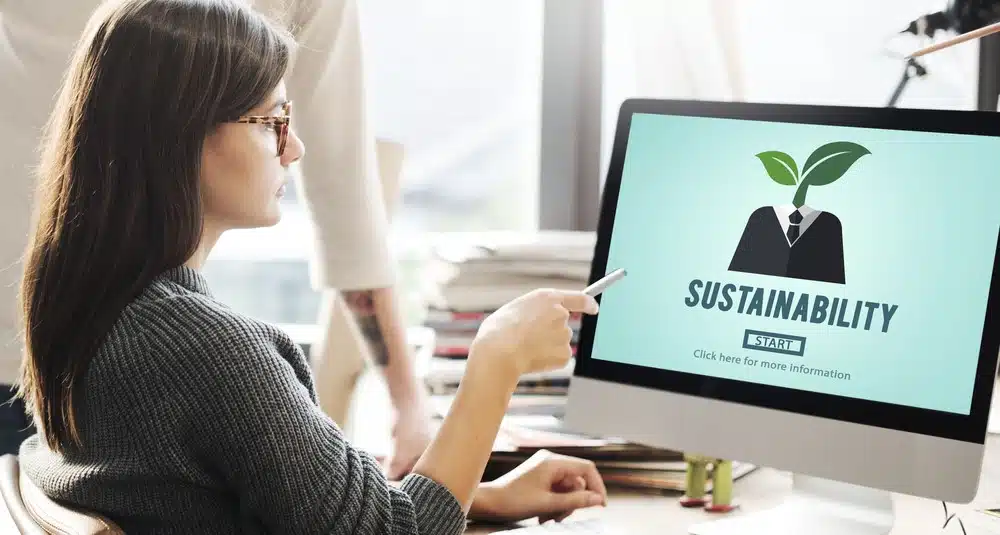
Businesses can enjoy significant benefits by implementing sustainability in the workplace. Not only does it mean they are helping to save the planet, but they can also service a growing consumer demand and expand their talent pool.
It may sound like an overwhelming task, but introducing sustainable practices in your office or workplace is simple if approached in manageable steps.
In this article, company formation agent, 1st Formations, will guide you through their top tips on how to do this effectively. From switching to environmentally friendly suppliers and improving energy efficiency, they’ll suggest practical sustainability solutions for small businesses.
Assess your environmental impact
Before seeking the right sustainable practices for your company, you should first assess the environmental impact that you are currently having. The outcome will depend on your business activities and the industry you operate in. For example, if you’re a manufacturer, your environmental impact will be higher than that of a standard commercial office.
A simple way to get started is through the B Impact Assessment. Operated by B Lab Global, a non-profit network helping businesses become more sustainable, the B Impact Assessment is a digital questionnaire that reviews your company’s existing practices. It then compares your impact with thousands of other businesses that have taken the test and identifies how you can improve your sustainability solutions.
The assessment focuses on the following areas:
- Governance – Your overall mission and engagement with your social and environmental impact.
- Workers – Your company’s contribution to employees’ financial security, health, and career development.
- Community – How you engage with your communities.
- Environment – Your overall sustainable practices.
- Customers – The quality of your products and services, ethical marketing, and data privacy practices.
Before doing your assessment, you might find it useful to see how your company’s sustainability compares to others. Use the B Corp directory to see all the global organisations that are B-certified and what they scored on their assessment.
Now, let’s go into our recommendations for implementing sustainability in the workplace.
Switch to sustainable suppliers
One of the biggest areas that will affect your sustainability impact is procurement. If you’re not already doing so or are unsure about how sustainable your supply chain is, start by evaluating this part of your business and making eco-friendly changes.
One way you can do this is to switch to a packaging supplier that uses recycled paper. Another option is to use a sustainable ink supplier that offers refillable or recyclable cartridges.
Switching to sustainable suppliers is often the cheaper option, especially if you work with local organisations. You will need to do your research and find a supplier that meets your business as well as sustainability needs. Remember to check their green accreditations and invest in good-quality services to ensure that your sustainability movements are effective and long-term.
Energy efficiency
Whether you work from home or have an office space, you can implement energy-efficient solutions to make a considerable environmental difference. You can do this by switching to eco-friendly light bulbs.
Traditional light bulbs waste most of the energy they produce. More sustainable options are halogen, which is slightly more efficient than traditional bulbs, compact fluorescent lamps (CFLs), which use up to 80% less energy than traditional bulbs, and light-emitting diodes (LEDs), which are the popular replacement for CFLs.
You can also use modern strip lights (linear fluorescent lights), an efficient and higher-quality option specifically for office spaces. For general lighting, you should opt for LEDs or CFLs.
To make this swap even more sustainable, you should consider installing motion sensor lights in your workplace. That way, you’ll only be using energy as and when it’s needed, ensuring zero waste when someone forgets to turn the light off.
Motion sensors may not be suitable for all locations (such as meeting rooms), so you can install them in areas that are used less frequently, such as bathrooms.
According to the Energy Saving Trust, you could save up to £14 per bulb per year by switching 100-watt traditional light bulbs to LEDs, and up to £5 per year per bulb by switching 50-watt halogens to LEDs.
Water efficiency
Another way to implement sustainability in the workplace is to introduce water-efficient solutions. According to Water Regs UK, 80% of Brits waste water regularly. This comes from habits like leaving the tap running when we brush our teeth, taking long showers, and boiling a full kettle of water as opposed to the required amount.
There are many ways to offset some of this water waste in the workplace. For example, you can install sensor taps in your bathrooms and kitchens. Not only do these taps ensure that you only use the water you need, but they also have a lower flow rate, saving up to 60% more water than a regular tap.
Another sustainable option for water usage is to use dual-flush toilets. This gives you the option of a half flush when a full one isn’t needed. This way, like sensor taps, you’ll only use the water you need, saving up to 6 litres of water per flush.
However, dual-flush toilets are more prone to blockages, so if you do install them in your workplace, they’ll require regular maintenance. To keep on top of this, you should educate and remind your staff about the materials that shouldn’t be flushed such as make-up wipes, hand towels, and sanitary products. Only toilet paper should be flushed to prevent blockages and leaks.
Waste management
Commercial recycling
If you currently only have general waste bins in the workplace, it’s time to add multi-use recycling bins. These require you to separate your waste materials into categories (typically glass, plastic, paper, and food).
Not only will you reduce landfill waste by implementing recycling solutions, but you’ll also help reduce your company’s carbon footprint, reduce pollution, and conserve natural resources that can be repurposed. Recycling requirements vary in different locations, so you should check with your local council to see how you should be recycling in your workplace.
You can go one step further and switch to a zero-to-landfill carrier such as First Mile. As well as ensuring that your recycled waste is properly disposed of, they send general waste (that can’t be recycled) to generate green energy, meaning that nothing is sent to landfill.
Eliminate single-use items
To promote recycling in the workplace, you should avoid single-use items. That’s because they normally end up in landfill and take years to decompose. So, rather than issuing plastic cups to your employees, for instance, try reusable cups.
These are often produced from recycled materials themselves, last much longer, and cost much less than constantly supplying single-use cups. To incentivise people to use reusable cups, you could opt for branded or personalised ones.
Use recycled materials
You can incorporate the use of recycled materials into your workplace as one of your sustainable practices. For example, for your common areas, you can opt for sofas made from ethically sourced fabrics. For your meeting rooms, you could use tables made from reclaimed wood.
Sustainable furniture is built to last, so not only will you be doing your part for the planet, but you’ll also be saving money by reducing the need to replace these items frequently.
If you’re on a smaller budget, using recycled notepads or bamboo toilet paper in your bathrooms are simple and inexpensive ways to implement sustainability in the workplace. These solutions promote the reuse of materials, prevent them from ending up in landfills, and reduce your carbon footprint.
Achieve sustainable accreditations
Finally, your company should aim for sustainable accreditations. We mentioned B Lab previously, one of the largest global business sustainability networks. Their certification is called B Corp, which is widely recognised in the UK.
Other accreditations include Green Mark, Planet Mark, and the Good Business Charter. Like the BIA Assessment, these programmes work with your business to help you improve your sustainability practices and implement them for the long term.
These certifications are incredibly powerful, showing your clients and customers that you value sustainability and take it seriously. They also set your business apart from others, making it a more attractive place to work and engage with.
Conclusion
There are many options for businesses wanting to implement sustainability in their workplace. A simple place to start is to switch to eco-friendly materials like reusable coffee cups or recycled stationery.
The next step can be to work with green suppliers and improve the sustainability of your supply chain. Finally, you can also install energy and water-efficient solutions in the workplace and solidify your commitment to sustainability with accreditations.
Partner With Us
The Institute for Sustainability Africa (INŚAF) is an independent multi-disciplinary think tank and research institute founded in Zimbabwe in 2010 with the Vision to advance sustainability initiatives for Africa.




